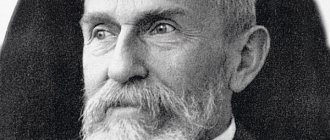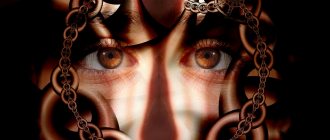Legal approaches to determining insanity
The traditional interpretation of insanity is based on its definition through two criteria: medical (psychiatric) and legal (psychological). These criteria are understood, respectively, as the presence of an illness or other painful mental disorder and the resulting inability to realize the nature or meaning of one’s actions or to manage them. Both criteria of insanity are interrelated and mandatory. The absence of any of them excludes the presence of the specified state of a person’s psyche, since the insanity of a person includes a simultaneous combination of medical and legal criteria.
Insanity is a state of a person established by a court on the basis of a psychiatric examination, which excludes the application of criminal law in relation to him. The legal meaning of insanity is the release of a citizen who has committed a socially dangerous act described in criminal law from criminal and civil liability. To put it simply, an insane person can crash your car in an accident, beat you, rob your wife, rape your child, and nothing will happen to him for this, and no one will compensate you for either material or moral damage.
In modern Russian legislation, insanity is defined in Article 21 of the Criminal Code of the Russian Federation:
Article 21. Insanity
- A person who, at the time of committing a socially dangerous act, was in a state of insanity, that is, could not realize the actual nature and social danger of his actions (inaction) or control them due to a chronic mental disorder, temporary mental disorder, dementia or other painful condition, is not subject to criminal liability. psyche.
- A person who has committed a socially dangerous act provided for by criminal law in a state of insanity may be imposed by a court with compulsory medical measures provided for by this Code.
Insanity excludes the very concept of crime. The act of an insane person seems to be a case that entails only preventive measures, for example, placement in a psychiatric hospital, under the special supervision of guardians, etc.
But these measures are not a consequence of an act committed, but of the discovery of a painful condition that requires special supervision and treatment. No one is responsible for the civil consequences of a crime committed by an insane person, except in cases where a guardian has already been appointed by the court to the insane person before the commission of the crime. The guardian bears civil liability only if he could have prevented the commission of the crime and/or through obvious negligence allowed it to be committed. But in this case, liability is determined not by the fact that the crime was committed by an insane person, but by the fact that there was negligence of the persons whose duties included supervision. If it is proven that the person who committed the crime is in a state of insanity, criminal prosecution cannot be initiated, and the one initiated can be terminated.
Nevertheless, such a person does not remain free, because he is dangerous to society. Current legislation provides that “mad and insane”, if they cause death or encroach on the life of another or their own, are sent for compulsory treatment by court decision, even in the event that their parents or relatives wish to take upon themselves the obligation to watch look after them and treat them at home. The law provides for the possibility of placing persons who commit a crime in a state of insanity for treatment in closed psychiatric hospitals (there are eight such hospitals in Russia). In fact, this is the same prison, since it is almost impossible to escape from there.
Such a medical institution is an institution that has both the characteristics of a medical institution and a colony: there are bars on the windows, the doors to the rooms are locked, patients leave them only to eat, use the toilet or to breathe air in a small exercise yard. Personal space is limited, there is a lot of crowding of people. A person spends all his time in these conditions. He is isolated not only from society, but also from medical staff. The corridor where the doors open ends with bars. FSIN officers armed with service weapons are on duty in the corridor and outside the perimeter. There are fences and video cameras all around. In fact, the medical facility is equipped as a correctional facility. An insane person who ends up here must take medication, regardless of whether he wants to or not. At the same time, all unfavorable social ties are broken. After undergoing treatment under strict conditions, usually lasting several years, the patient is not immediately discharged to life. If doctors see that the condition is sufficiently compensated, the local commission sends a petition to the court to transfer the citizen to treatment with an enhanced monitoring regime. Then six months or a year passes, and if the state of mental health improves, the patient is transferred to a regular psychiatric hospital, then to compulsory outpatient treatment by a psychiatrist, of course, provided that his condition allows it.
In general, the more serious the socially dangerous act, the more stringent the requirements for the person who committed it, the more isolated he is, and he will definitely not be able to leave a psychiatric institution quickly. Some patients who show no improvement in their mental health and remain dangerous to society remain in such hospitals for years.
It is worth emphasizing that compulsory treatment cannot be considered a punishment - it is a precautionary measure to protect society from the subsequent actions of an insane person. At the same time, there is a common opinion that if a person has committed a crime, especially a resonant one, in a state of insanity, he evades responsibility, since compulsory treatment is not comparable to the committed act. However, the regime in closed medical psychiatric institutions is very strict; this is not a health-improving sanatorium with spa treatments and relaxing massages; specialized psychiatric treatment is applied to the patient.
Moreover, the perpetrator is not given a specific period of time for treatment, as is the case with prison. Here all key decisions remain with doctors. When they are sent to a hospital, a second medical commission is held either once a year or every six months, and if it recognizes that the person has recovered, which is not always the case, then he can be released.
Even after discharge, a person must be observed by a psychiatrist and registered, as happens with people released early from prison. But it may not come to this - often criminals sent for compulsory treatment can be left in hospitals for life if their illness is not treated.
Part 1 of Article 21 of the Criminal Code of the Russian Federation lists various types of mental disorders, including: chronic mental disorders, temporary mental disorders, dementia and other painful mental conditions.
Let us note that these concepts constitute the medical criterion of insanity, considered in conjunction with the legal one, which in turn contains:
- intellectual - the impossibility of realizing the actual nature and social danger of one’s actions (inactions);
- strong-willed, which means the inability to lead them;
- Also, in the science of criminal law, a temporal criterion is highlighted, which links medical and legal criteria with the time of commission of a socially dangerous act.
A chronic mental disorder is understood as “a long-term mental illness that tends to progress, that is, to a gradual increase and complication of mental disorders.” Naumov A.V. noted that chronic mental disorders “can sometimes occur in attacks (that is, with an improvement or deterioration of the mental state), but they can leave behind a persistent mental defect.”
Such disorders usually include schizophrenia, epilepsy, progressive paralysis, bipolar disorder (the one that previously bore the “politically incorrect” name of manic-depressive psychosis, etc.). However, “the mere presence of the listed diseases is not a basis for declaring him insane.” In psychiatry, for example, there are more than 100 types of schizophrenia, many of which occur latently and, therefore, cannot influence the intellectual element of the legal criterion. Moreover, psychiatry is currently developing rapidly, finding new methods of treating mental illnesses that make it possible to achieve long-term remissions, which, of course, affects the course of many chronic mental disorders.
Temporary mental disorders include those diseases that develop quickly, last a short time and end with complete recovery.
Such mental disorders arise spontaneously, and are also “characterized by a dynamic course, usually accompanied by severe disturbances of consciousness, orientation, productive psychopathological states in the form of illusions, hallucinations and delusional interpretation of the environment. Temporary mental disorders include alcoholic psychosis in the form of delirium (delirium tremens), twilight disorder of consciousness (characterized by amnesia), etc.
Dementia refers to all mental disorders accompanied by persistent impoverishment and simplification of mental activity, characterized by disruption of cognitive processes, behavior, impoverishment of emotions and individual character traits (up to their complete disappearance).
Dementia is associated with a decrease or loss of a person’s mental abilities and is congenital or acquired as a result of one or another progressive mental illness. For example, oligophrenia is classified as congenital, and encephalitis is classified as acquired. So, we note that there are three degrees of dementia: mild (debility), moderate (imbecility) and severe (idiocy).
The last, fourth sign of the medical criterion most often includes those diseases that, although not classified as a mental disorder, may, at the time of exacerbation, be accompanied by mental disorders. Such, for example, as acute hallucinatory delusional states caused by infection (with typhoid and typhus or acute chemical poisoning), severe head injuries, brain tumors, drug addiction or sleepwalking, as well as some forms of psychopathy (severe schizoid psychopathy), some forms of deaf-muteness.
However, the signs of the medical criterion that we have considered do not yet provide complete confidence in the insanity of the person who committed the crime, since the presence of one of the listed diseases may not affect the intellectual or volitional elements.
The leading criterion for determining insanity is legal, indicating the depth of mental disorder, which does not allow a person to realize the social danger and the consequences of his actions (inactions) and manage them.
It is the legal criterion that indicates the condition under which a mental disorder acquires criminal legal significance.
The legal criterion is a generalized characteristic of the same clinical data on mental disorders, but from the point of view of their influence on the attitude towards the crime being committed, and consists of two signs:
- intellectual, as a violation of the ability to understand the actual nature and social danger of one’s actions
- volitional, as a violation of the ability to direct such actions.
Commentary on Article 21 of the Criminal Code of the Russian Federation
1. In case of insanity, the subject of the crime is eliminated, and therefore the grounds for criminal liability. An insane person cannot commit a crime and be found guilty of it. In accordance with Part 2 of the commented article, such a person may be subject to medical measures that are not criminal penalties.
2. Insanity is characterized by two criteria:
1) legal (psychological);
2) medical (biological).
The legal (psychological) criterion of insanity is the inability to realize the actual nature and social danger of one’s actions (inaction) or to control them.
The medical (biological) criterion is expressed in painful mental states (chronic mental disorder, temporary mental disorder, dementia, other painful mental state).
3. The legal (psychological) criterion includes intellectual and volitional aspects.
The intellectual moment characterizes the possibility of understanding the actual nature and social danger of an act. It shows the degree of adequacy (inadequacy) of the reflection in consciousness of the act being committed and its social significance.
The volitional criterion reflects the ability to direct one’s behavior in accordance with existing ideas.
Inadequate reflection of reality with a disorder of the intellectual sphere of consciousness excludes the possibility of directing one’s actions. At the same time, the intellectual and volitional spheres are relatively independent. Therefore, an adequate reflection of reality does not exclude defects in the expression of will. Similar cases are observed, for example, with drug and alcohol psychoses.
4. Insanity is declared only if both criteria are present: legal and medical. Separately, they do not characterize the state of insanity.
If the person who has committed a socially dangerous act does not realize the actual nature and social danger of his actions (inaction), but not due to a painful mental state, but for other reasons: lack of experience, knowledge; violent influence, etc., then he can be found innocent, but not insane.
Also, and conversely, the presence of a painful mental state does not mean a lack of ability to realize the actual nature and social danger of the committed act, since acts are different in nature and do not always require mental effort, and the course of the disease is uneven and does not necessarily cause inadequacy in the perception and assessment of ongoing events.
5. The commented article provides a complex (alternative) description of each of the criteria. Thus, the legal (psychological) criterion presupposes the absence of the possibility of awareness or the actual nature of the act being committed or its social danger. As a rule, awareness of the actual nature of the actions taken means understanding their social danger.
However, a discrepancy is also possible when awareness of the actual nature of the act being committed is not accompanied by an understanding of its social danger, which is especially characteristic of a sick psyche. This is predetermined by the fact that in order to understand the actual nature of the act and its social danger, different levels of knowledge are required, requiring different abilities to assimilate information.
Awareness of the actual nature of the act being committed presupposes an understanding of the external, superficial side of the act - what a person does in a utilitarian-everyday sense, for example, strikes, destroys or moves property. Awareness of the social danger of an act presupposes an assessment of its internal content from the point of view of its impact on social relations. It involves finding out why the blow is being struck, for what purposes, etc.
6. The medical (biological) criterion also contains several alternatives:
1) a chronic mental disorder, unlike other mental disorders, is characterized by a duration of occurrence, progressive development, intractability or incurability at all. Such diseases include epilepsy, schizophrenia, progressive paralysis, etc.;
2) a temporary mental disorder ends in recovery. Such disorders include mainly various psychoses (alcoholic, reactive, somatic: delirium tremens, alcoholic hallucinosis, drug withdrawal);
3) dementia is characterized by a persistent decrease in thinking, memory and criticality. There are three degrees of dementia: debility, imbecility and idiocy. Dementia can be either congenital or acquired;
4) another painful mental disorder is characterized by certain mental disorders: psychopathy, mental infantilism, some cases of deaf-muteness, etc.
7. Any painful mental state due to which a person could not realize the actual nature and social danger of his actions or control them excludes criminal liability <1>.
——————————— <1> BVS of the Russian Federation. 2005. N 4.
8. Judicial practice is based on the presumption of sanity of the person who committed the crime. If there is doubt about sanity, a forensic psychiatric examination is carried out. The practice recognizes that the reason for its implementation is the presence of a person in the past of mental illness, severe head injuries, memory loss, manifestations of extreme cruelty, sadism, etc. However, it should be borne in mind that the concept of insanity is legal, not medical. Accordingly, the conclusion about the presence of insanity is made by the court, and not by the forensic psychiatrist.
9. The concept of insanity is applicable only to socially dangerous acts, the characteristics of which are given in the criminal law. Therefore, it is unlawful to call a mentally ill person who has not committed a socially dangerous act insane.
Medical criterion of insanity
The medical or biological criterion is based on the postulates of the science of psychiatry.
Using this criterion, the painful state of the psyche of the person who committed the crime is determined.
In psychiatry, there are several types of mental disorders:
- as a result of a chronic disease, which, as a rule, is difficult to treat or incurable at all, for example, with schizophrenia, depressive psychosis, paranoid illness;
- a temporary mental disorder lasts transiently and can be cured, for example, delirium tremens, alcoholic psychosis, severe affective states as a result of a mental disorder;
- dementia, when a person’s intellect is destroyed, as a result of which a decline in a person’s mental activity is observed, for example, due to a decrease in mental development, debility, imbecility or idiocy may develop;
- other mental disorders caused as a result of various human diseases, which led to the appearance of acute hallucinations, inappropriate behavior, for example, in cases of drug addiction, these disorders can manifest themselves due to drug starvation, sleepwalking, brain tumors, acute poisoning.
Investigators and judges can identify these mental illnesses only visually, but only a medical professional with education in the relevant field of medicine can make a diagnosis.
Age-related insanity
Another mental state of a person that has criminal legal significance is the so-called “age-related insanity”, which is not subject to criminal liability. As a general rule, a person over 16 years of age can bear criminal liability. However, from the age of 14, one can be held criminally liable for committing crimes that are listed in Part 2 of Art. 20 of the Criminal Code of the Russian Federation.
It should be noted here that not all persons who have reached the age specified by law, due to the lack of the necessary psychophysical properties, can correctly assess their behavior. In such cases, the rule formulated by the legislator in Part 3 of Article 20 of the Criminal Code of the Russian Federation is applied. This concept excludes the medical criterion of insanity, since this norm speaks of mental retardation (discrepancy between the intellectual development of a person and the age reached by the person), and not of a mental disorder. The reasons for such a delay in development may be social infantilism, sensory deprivation, somatic diseases suffered in early childhood, namely, before the age of 2 years in severe form.
Thus, “age-related insanity”, like insanity, excludes criminal liability.
States of passion and insanity in criminal law. Reference
In criminal law, physiological affect is associated with a sudden strong but short-term emotional state (mental excitement), in which disorganization of mental activity occurs. A person does not completely lose understanding of the situation and the actions he performs, but he practically does not control them.
The most important signs of physiological affect are: - suddenness of occurrence (affect occurs suddenly against the will of a person and, as it were, takes possession of him);
— explosive dynamics (in a short period of time the state reaches its highest limit);
- short duration (affect is measured in seconds and minutes; the statement that affect lasts 15–20 minutes or more is an exaggeration: for such a long time a person can be in a different mental state, but not in an affective one);
— intensity and tension of the course (in a state of passion, a person acquires additional physical strength and capabilities);
- a disorganizing effect on mental activity (in a state of passion, a narrowing of consciousness is observed to the limits of a psychotraumatic situation, flexibility of thinking is lost, the quality of thought processes decreases, self-control is sharply lost, purposefulness and understanding of the appropriateness of actions are disrupted);
- increased motor activity, a sharp increase in behavioral acts (a person makes erratic movements, inflicts many wounds on the victim), etc.;
- vegetative changes (characterized by changes in skin color (redness, pallor) and voice modulation, respiratory arrhythmia, drying out of the oral mucosa, intensification of cardiac activity, etc.).
The consequences of affect can be partial amnesia and asthenic syndrome (the suspect (accused) is sometimes unable to remember individual details of the incident, for example, cannot say where he took the crime weapon, where and how he struck the victim, etc.).
Asthenic syndrome is characterized by decline: physical and neuropsychic weakness, increased fatigue and exhaustion, decreased sensitivity threshold, extreme mood instability, sleep disturbance.
A decrease in the adequacy of human behavior may also be observed. The latter is especially acute in attempts to hide a crime (for example, by simulating suicide).
A person who commits a crime in a state of physiological affect (or some other emotional states) is subject to criminal liability.
Pathological affect is a short-term painful mental disorder, accompanied by deep clouding of consciousness, impulsive acts, partial or complete loss of memory (amnesia). It is characterized by a concentration of consciousness on traumatic experiences followed by an affective discharge. A person’s actions are accompanied by incoherent speech and excessive gesticulation. The post-affective state manifests itself in general weakness, drowsiness or deep sleep.
Pathological affect is an exceptional condition and is quite rare in forensic practice. To establish the affect at the time of committing illegal actions by persons suffering from mental illness (schizophrenia, epilepsy, manic-depressive psychosis, etc.), comprehensive forensic psychological and psychiatric examinations are carried out.
Persons who have committed crimes in a state of pathological affect are recognized as insane and are not responsible for their actions (inaction).
Affect acquires criminal legal significance if the state of sudden strong emotional disturbance (affect) is caused by violence, bullying, grave insult on the part of the victim or other illegal or immoral actions (inaction) of the victim, as well as a long-term psychotraumatic situation that arose in connection with with systematic illegal or immoral behavior of the victim.
The presence of a person in a state of passion when committing crimes is a circumstance that significantly reduces responsibility for the committed act.
The Criminal Code of the Russian Federation contains two articles providing for liability for committing a crime in a state of passion: committing murder (Article 107) and causing grievous or moderate harm to health (Article 113). The crime provided for in Art. 113 of the Criminal Code is a crime of minor gravity, while even the intentional infliction of moderate harm to health without qualifying criteria (Article 112 Part 1) is a crime of moderate gravity; murder committed in a state of passion (Article 107) is a crime of moderate gravity, and intentional murder without qualifying features (Article 105 part 1) is a serious crime.
The presence of a person in a state of passion is a circumstance subject to proof (Article 73 of the Code of Criminal Procedure of the Russian Federation).
Insanity in criminal law is the inability of a person to realize the actual nature and social danger of his actions (inaction), or to control them due to a chronic mental disorder, temporary mental disorder, dementia or other painful mental state (Article 21 of the Criminal Code).
The basis for declaring a person insane is the presence of one of the signs of legal and medical criteria.
The legal criterion is the lack of ability of a person to account for and control his actions. The legal criterion includes intellectual and volitional characteristics. Intellectual - a sign indicating a disorder of consciousness, expressed in the inability of a person to realize the actual nature and social danger of an action (inaction). Volitional is a sign indicating a disorder of the will, expressed in the inability of a person to direct his actions.
The medical criterion indicates various forms of mental disorders, expressed in disruption of the activity of the human brain. Contains four signs: chronic mental disorder, temporary mental disorder, dementia, and other painful mental state.
Chronic mental disorders are chronic mental illness, i.e. long-term mental disorder (schizophrenia, epilepsy, progressive paralysis, paranoia, etc.).
Temporary mental disorder is a mental illness that lasts for a certain period of time (relatively quickly) and ends with recovery (pathological intoxication (delirium tremens), pathological affect, reactive states, i.e. mental disorders caused by severe mental shocks and experiences).
Dementia is various types of decline or complete decline in mental activity associated with damage to a person’s intellectual abilities.
Another painful mental state is painful phenomena that are not mental illnesses, but, nevertheless, are also accompanied by mental disorders (can be observed with brain injuries, brain tumors, typhoid fever and other diseases).
Establishing the presence or absence of signs of medical and legal criteria for insanity is carried out by the court with the help of specialists in the field of psychiatry.
According to the Criminal Code of the Russian Federation, a person who was in a state of insanity at the time of committing a socially dangerous act is not subject to criminal liability (Article 21).
A person who has committed a socially dangerous act provided for by criminal law in a state of insanity may be imposed compulsory medical measures by the court:
— outpatient compulsory observation and treatment by a psychiatrist;
— compulsory treatment in a general psychiatric hospital;
— compulsory treatment in a specialized psychiatric hospital;
- compulsory treatment in a specialized psychiatric hospital with intensive supervision.
The material was prepared by the editors of rian.ru based on information from RIA Novosti and open sources
Legal consequences of criminal insanity
An insane person who is recognized as such at the time of committing a criminal act is exempt from criminal liability. Since the case will be dismissed due to the lack of corpus delicti, namely the subject of the crime.
An insane criminal, as a person unable to control his actions as a result of a mental disorder, cannot be legally responsible for his helpless state.
However, this does not mean that he will be placed back into the public environment to continue socially dangerous acts with impunity.
If it is determined that this citizen poses a threat to himself or those around him, the court will order compulsory medical measures.
This is not a punishment, but it will help cure a painful state of a person’s psyche or stop the disorder at a certain level and prevent the progression of the disease.
Legal criterion of insanity
This type of criterion allows us to understand to what extent a person was aware of the danger of his actions on an intellectual level and could manage them taking into account his volitional state.
We recommend! Legal characteristics of the Criminal Code of Russia
The derivation of a legal criterion is within the competence of the investigation and the court, however, they must proceed from the medical report and medical history of the guilty person.
The legal criterion is based on a forensic psychiatric examination, as a result of which it is possible to obtain an answer: whether a person could be aware of his criminal behavior and foresee the consequences, and whether he is able to control his actions.
Analysis and assessment of the mental state of a suspect or accused of a crime can take place at the stage of identification, investigation, and also directly in court.
Thus, the legal result of a person’s mental disorder will be obtained only on the basis of a medical report.











